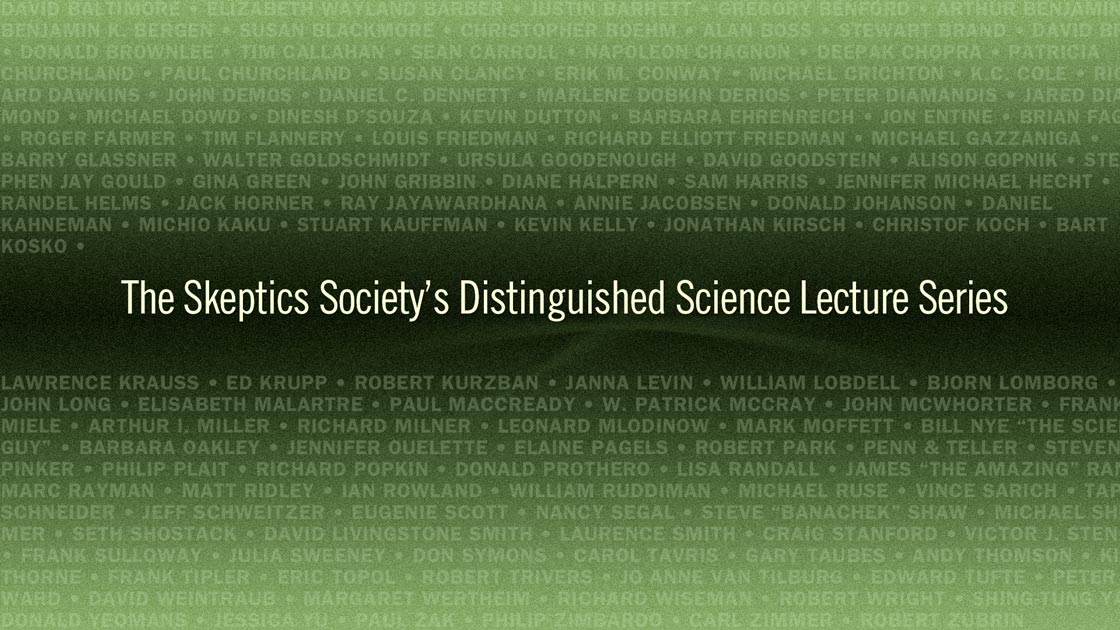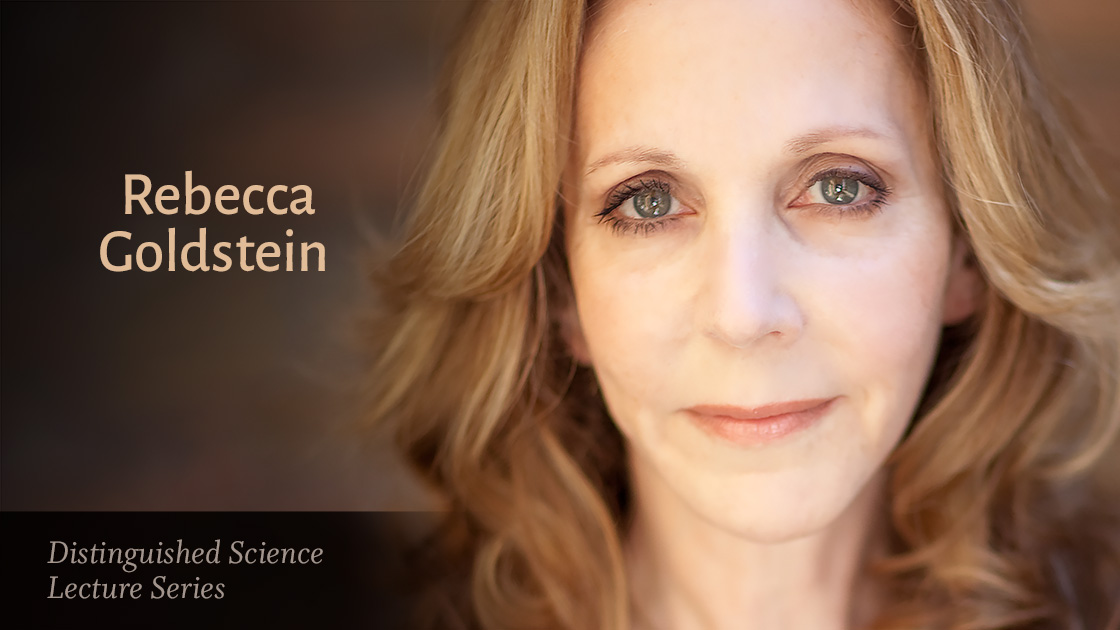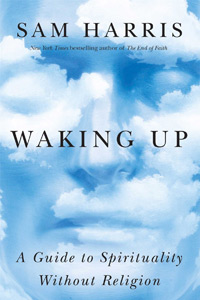In this week’s eSkeptic:
Our Next Science Lecture
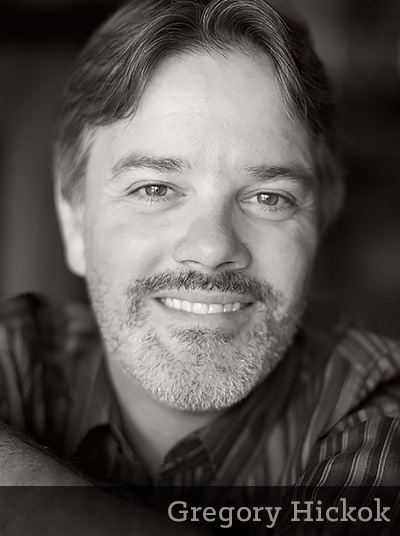
The Myth of
Mirror Neurons
with Dr. Gregory Hickok
Sun., Sept. 21, 2014 at 2 pm
IN THIS MYTH-BUSTING TALK based on his new book, U.C. Irvine cognitive scientist Dr. Gregory Hickok calls for an essential reconsideration of one of the most far-reaching theories in modern neuroscience and psychology. Ever since the discovery of mirror neurons in macaque monkeys in 1992 there has been a stream of scientific studies implicating mirror neurons in everything from schizophrenia and drug abuse to sexual orientation and contagious yawning. Drawing on a broad range of observations from work on animal behavior, modern neuroimaging, neurological disorders, and more, Dr. Hickok argues that the foundational assumptions fall flat in light of the facts. He then explores alternative explanations of mirror neuron function while illuminating crucial questions about human cognition and brain function: Why do humans imitate so prodigiously? How different are the left and right hemispheres of the brain? Why do we have two visual systems? Do we need to be able to talk to understand speech? What’s going wrong in autism? Dr. Hickok provides deep insights into the organization and function of the human brain and the nature of communication and cognition. Order The Myth of Mirror Neurons from Amazon. A book signing will follow the lecture.
Followed by…
- The Sense of Style: The Thinking Person’s Guide
to Writing in the 21st Century
with Dr. Steven Pinker
Saturday, October 4, 2014 at 2 pm - The Island of Knowledge: The Limits of Science
& the Search for Meaning
with Dr. Marcelo Gleiser
Sunday, October 5, 2014 at 2 pm - Do Zombies Dream of Undead Sheep? A Neuroscientific View
of the Zombie Brain
with Dr. Bradley Voytek
Sunday, October 19, 2014 at 2 pm - The Psychology of Magic (includes a magic show!)
with Dr. Tony Barnhart
Sunday, November 23, 2014 at 2 pm - Alan Turing: The Enigma
with Dr. Andrew Hodges
Sunday, December 7, 2014 at 2 pm

MonsterTalk # 88
City Lion, Country Lion
Was an African lion wandering the streets of Los Angeles? The case of the Norwalk Lion is solved beyond reasonable doubt—yet why do questions linger?
DISTINGUISHED SCIENCE LECTURE
Dr. Rebecca Goldstein — Plato at the Googleplex: Why Philosophy Won’t Go Away
Stephen Hawking said philosophy is dead. Plato would disagree, says the acclaimed philosopher and novelist Rebecca Goldstein, who provides a dazzlingly original plunge into the drama of philosophy, revealing its hidden role in today’s debates on religion, morality, politics, and science. Philosophy is not obsolete, and the ancient questions that Plato asked are still relevant in the age of cosmology and neuroscience, crowd-sourcing and cable news. Imagine that Plato came to life in the 21st century and embarked on a multicity speaking tour. How would he handle the host of a cable news program who denies there can be morality without religion? How would he mediate a debate between a Freudian psychoanalyst and a tiger mom on how to raise the perfect child? How would he answer a neuroscientist who, about to scan Plato’s brain, argues that science has definitively answered the questions of free will and moral agency? What would Plato make of Google, and of the idea that knowledge can be crowd-sourced rather than reasoned out by experts? With a philosopher’s depth and a novelist’s imagination and wit, Goldstein probes the deepest issues confronting us by allowing us to eavesdrop on Plato as he takes on the modern world. Order Plato at the Googleplex from Amazon.
You play a vital part in our commitment to promote science and reason. If you enjoyed this Distinguished Science Lecture, please show your support by making a donation.
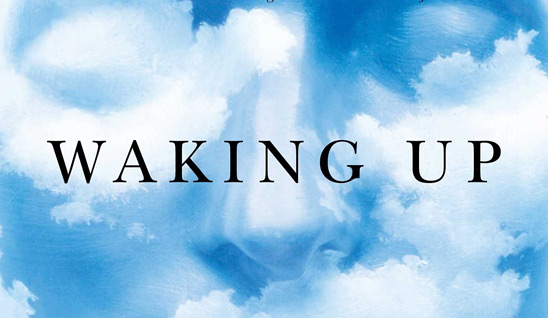
About this week’s eSkeptic
“Is there a happiness that does not depend upon having one’s favorite foods available, or friends and loved ones within arm’s reach, or good books to read, or something to look forward to on the weekend? Is it possible to be happy before anything happens…in spite of life’s difficulties, in the very midst of physical pain, old age, disease and death?… [M]ost of us are living as though the answer were ‘no.’” says Sam Harris in his new book, Waking Up: A Guide to Spirituality Without Religion, reviewed by Sigfried Gold in this week’s eSkeptic. The book is available in stores on September 9, 2014.
Sigfried Gold writes and speaks about spirituality, atheism, ethics, recovery, and the spiritual challenges and opportunities faced by religious outsiders and skeptics. Writing by and about him is available at tailoredbeliefs.com. He has Master’s degrees in Creative Writing and Biomedical Informatics and makes a living designing and building interactive information visualization tools that allow researchers to explore and make sense of complex data. He lives with his wife and two kids in Washington, DC and tweets occasionally at @godforatheists.
Share this article with friends online.
Subscribe | Donate | Watch Lectures | Shop
Atheist Spirituality
by Sigfried Gold
Sam Harris is not the only atheist offering a replacement for something that’s gone missing after the rejection of religion, but what’s needed now, he claims, is a “rational approach to spirituality.” He courageously offers such an approach in Waking Up: A Guide to Spirituality Without Religion. Courageously, I say, because his presumed audience shares his rejection of religion, but not necessarily his judgment that something is missing, much less his diagnosis of what that thing is; and many in his audience can be expected to have a positive hostility to his suggestion that they suffer a malady whose indicated treatment is spirituality, rationally approached or otherwise.
In the few years since the publication of respected atheist philosopher Jürgen Habermas’s An Awareness of What is Missing: Faith and Reason in a Post-Secular Age, there have been a spate of atheist attempts to redress a range of deficits perceived to attend a secularist worldview. For Greg Epstein (Good Without God) and Ronald Dworkin (Religion Without God), the problem is finding a replacement for God’s authority as a foundation for a definite system of ethics. Communal bonding is the central issue for the Sunday Assembly and the atheist churches founded by Jerry DeWitt and Mike Aus. Alain de Botton (Religion for Atheists) thinks it’s beautiful buildings, choral music, and comforting rituals.
Whether or not Harris is aware of his position in a wider exploration by secularists of valuable aspects of religion, his treatment of this single aspect—personal spirituality—is an important contribution. Like the contemplatives or mystics of ancient traditions, Harris points us towards practices and ideas that shift our fundamental attitude towards life, that give us a shot at an abiding happiness in harmony with the greater good so we’re not just scrambling after private pleasures or an edge in the rat race.
Rhetorically, he asks, “Is there a happiness that does not depend upon having one’s favorite foods available, or friends and loved ones within arm’s reach, or good books to read, or something to look forward to on the weekend? Is it possible to be happy before anything happens…in spite of life’s difficulties, in the very midst of physical pain, old age, disease and death?… [M]ost of us are living as though the answer were ‘no.’ No, nothing is more profound than repeating one’s pleasures and avoiding one’s pains…seeking satisfaction…moment after moment. Just keep your foot on the gas until you run out of road.”
Given Harris’s status as one of the four horsemen of the New Atheism, he surely spends a lot of time around people who are not seeking extra-profound happiness, who celebrate their freedom from the shackles of religious delusion, freedom to live life as it comes with no promise of an abiding happiness only spirituality can buy. This is a bold performance for Harris, maybe to the point of recklessness, switching his role from debunker of other people’s promises of salvation to hawker of his own. Negative reactions are sure to be swift and loud; but it will be fascinating to see who does hearken to his call to Wake Up and how they do it.
Harris is at great pains to distance the particular forms of Eastern spirituality he advocates from irrational religions. He rejects the mystifications and faith demanded by religious authorities. He defies the squeamishness of liberals and moral relativists who “do not want to hear that Islam supports violence in a way that Jainism doesn’t, or that Buddhism offers a truly sophisticated, empirical approach to understanding the human mind, whereas Christianity presents an almost perfect impediment to such understanding.” In the particular case of the traditions he is most familiar with—Advaita Vedanta and Dzogchen Buddhism—no faith is required and all claims can and should be verified by personal experience. “Unlike the doctrines of Judaism, Christianity, and Islam, the teachings of Buddhism are not considered by their adherents to be the product of infallible revelation.” “[Buddhism] isn’t primarily a faith-based religion, and its central teachings are entirely empirical. Despite the superstitions that many Buddhists cherish, the doctrine has a practical and logical core that does not require any unwarranted assumptions.”
The cornerstone of an empirically verifiable spiritual program is mindfulness, which Harris says is, “simply a state of clear, nonjudgmental, and undistracted attention to the contents of consciousness, whether pleasant or unpleasant.” “The principal enemy of mindfulness [is our] habit of being distracted by thoughts. The problem is not thoughts themselves but the state of thinking without knowing that we are thinking… [T]he difference between ordinary experience and…‘mindfulness’ is not very clear, and it takes some training to distinguish between being lost in thought and seeing thoughts for what they are.” Harris borrows an illustration from Insight Meditation Society co-founder Joseph Goldstein. He “likens this shift in awareness to the experience of being fully immersed in a film and then suddenly realizing that you are sitting in a theater watching a mere play of light on a wall. Your perception is unchanged, but the spell is broken. Most of us spend every waking moment lost in the movie of our lives. Until we see that an alternative to this enchantment exists, we are entirely at the mercy of appearances.”
Having spent years meditating and studying similar forms of Buddhism myself I understand what Harris is describing and see it much the same way. But what are secularists being introduced to meditation and this type of spirituality for the first time to make of this? Is Harris really offering a spiritual practice verifiable by personal experience in a way that others are not? He gives exercises and instructions in sidebars throughout the book and provides audio guided meditations on his website. But from what I’ve seen, I am not sure that the benefits promised for meditation are discernable to many beginners. A lucky few will sit for the first time, close their eyes, and become suffused with heavenly calm. That’s not the point of meditation, and it’s unlikely to last through many sittings; but, at least for these lucky few, something happens right away in their own personal experience that convinces them to go on.
For most of us, however, our first attempts at meditation feel utterly pointless. We sit there uncomfortably, waiting for something to happen, either thinking the same tedious thoughts we always think or just wondering why it’s taking so long for the bell to ring. There is nothing in the experience itself that would convince us to go on. If we try the experiment a second time, it’s only because Sam Harris or some other enthusiast has gained our trust for some reason and made the promised benefits sound good enough for us to endure some suffering, confusion, and boredom in our attempts. But this trust is exactly what Harris says we should not need in embarking on a “rational approach to spirituality.”
When a beginning chemistry student performs an experiment in the lab, following instructions correctly, the expected reaction is sure to result. But the results we hope to see from meditation usually start to accumulate imperceptibly, becoming observable in hindsight only after considerable practice, dedication, guidance, and reflection. I believe in the promise and worth of mindfulness practice and many of the Buddhist ideas surrounding it just as much as Harris does. However, when I urge these beliefs on others, I know I’m asking no less than evangelists of any other tradition in terms of openness, commitment and an experimental trying on of unfamiliar practices and ideas. Fortunately, Harris offers more than just an invitation to try it for yourself. The book is interspersed with engaging and helpful accounts of his own spiritual quest. In addition to meditation instructions, he offers advice about gurus. There are a lot of bad ones out there and Harris does a fine job describing the terrible dilemma of the spiritual seeker needing to trust the guidance of someone who claims expert knowledge of life’s essential mysteries, without getting screwed (sometimes literally) in the process. I greatly appreciate the way he unflinchingly presents the dangers involved while still recommending the search as a worthwhile endeavor.
The bulk of the book, though, consists of an argument for Harris’s recommended spiritual practice based on a particular theory of brain and mind, which he supports with an array of evidence, explanations and ideas from philosophy, neuroscience, consciousness studies, and cognitive psychology. His fluency with the subject matter and breezy style make for an enjoyably thought-provoking read. But much as I enjoyed it, I take issue with the book’s central conceit, crystallized in the subtitle A Guide to Spirituality Without Religion, on two counts: 1) Harris neglects not just aspects and forms of spirituality from traditions he rejects but also huge swaths of the Buddhism and insight meditation he draws on, idiosyncratically focusing on the illusion of self and the role of altered states of consciousness in transcending it; and 2) most of the book is an argument for his views, not a guide at all.
To summarize Harris’s central argument: Consciousness is an undeniably real thing that can be studied scientifically and experienced directly by every conscious being, yet we are generally full of wrong ideas regarding its nature, and its essence remains, at least for now, an intractable mystery. On the other hand, self, which he describes as “the feeling of ‘I’”, as real as it may appear to us, is an illusion. The more we understand about consciousness, the less we can believe in the reality of self. And if we can go beyond mere intellectual understanding of these facts and directly experience the reality of consciousness without being taken in by the illusion of self, then we become, to one degree or another, enlightened: we escape the claustrophobic perch behind our eyes from which we peer out at the world; we experience true freedom; we are relieved of stress; we can enjoy, at least for a moment, universal love and all the other benefits promised by meditation.
Harris establishes the essential reality and mystery of consciousness by invoking Thomas Nagel’s famous essay, “What Is It Like to Be a Bat?” which argues that conscious beings have a subjective and distinctive sense of what it is like to be a being like themselves. As hard as it may be to imagine what it is like to be a different sort of conscious being than you are (e.g., a bat), you necessarily share with all conscious beings the one essential quality of consciousness, that you have any kind of subjective experience at all. The great mystery is: How can consciousness, which is not a physical thing, arise from and be attached to physical things?
To me, this is philosophical gobbledegook that obfuscates a clear view of the many different things we describe with the word consciousness, but it is a matter of lively debate amongst professional philosophers, and Harris sides with Nagel. But why is this such a crucial point for him? I’ve puzzled out a reason, which I’ll give below.
With an excursion into neuroscience, Harris’s field of expertise, we learn about all sorts of strange features of consciousness. The lesson, though, is that consciousness and the brain can be divided. People with damaged brains can demonstrably possess at least two distinct selves—two loci of consciousness. Maybe healthy people can as well. Harris leads a fun romp through the peculiarities and divisions of consciousness demonstrating that any idea of a singular, persistent self is scientifically unsupportable. Which means that contemporary neuroscience is in accord with the ancient Buddhist doctrine of no self.
We meditate, says Harris, both to break the illusion of self and to appreciate the reality and nature of consciousness. Beyond its strangeness and the mystery of existence, he briefly mentions one more supremely important quality: “Consciousness is also what gives our lives a moral dimension. Without consciousness, we would have no cause to wonder how we should behave toward other human beings, nor could we care how we were treated in return… [W]e have ethical responsibilities toward other creatures precisely to the degree that our actions can affect their conscious experience for better or worse.” We have ethical “obligations toward any creature that can suffer or be deprived of happiness.”
To my mind, Harris wants to dissect his metaphysical cake and eat it too. On the one hand, consciousness is entirely dependent on physical processes, it starts and ends with the start and end of sentient life, and it is susceptible to scientific investigation—maybe someday to scientific explanation—but not today; because, on the other hand, consciousness is mysterious, it is the thing that imposes ethical obligations on us where it exists, understanding its true nature is the path to abiding happiness and making the world a better place. Harris wants to hold on to arguments he’s made elsewhere that science can answer our ethical questions—by telling us where consciousness resides and how to optimize its happiness. In this book he is straining to carry the insights science gives us about how things are over to that inner place where things matter.
Harris gives us a guide to spirituality because discursive understanding obtained in the lab isn’t enough. Science confirms what we subjectively discover through meditation. Through meditation we can penetrate our true natures, maybe even to the point of solving the mystery of consciousness, while science plays catch up in giving objective legitimacy to our discoveries. But spiritual investigation (rationally approached) is not just quicker or more efficacious than reading articles in the Journal of Consciousness Studies, it is necessary. It is not enough to know the way to abiding happiness, we have to go there. It is not enough to map the precise extent of our ethical obligations, we have to honor them. This is a noble and romantic vision. A bit over-romanticized, perhaps.
So we viscerally have to feel that the self is an illusion, not just know it. Why? Because when we feel it we get all those other good feelings: universal love, beatific calm, etc. My primary objection to Harris’s scheme is based on my belief that people arrive at very similar feelings through innumerable paths, religious, spiritual, mystical, but also through psychotherapy, sometimes through literature, by observing the generosity or heroism of others, and maybe even by falling in love. For Harris, the only ways to transcendence require transcending the illusion of self, which you can do (slowly, unless you luck into sudden enlightenment) by meditation or (quickly) through the careful use of psychedelic drugs. Like all the other paths, sometimes it works, sometimes it doesn’t. Or it might work for a while and then stop (as happened with the drugs ingested by Harris recounted in a very entertaining opening chapter.) Like Harris, I’ve had enough of these feelings and experiences to want to evangelize for them however I can. If everyone could follow a path toward universal love, what a wonderful world it would be.
Which brings me to having to admit how bad I feel expressing my criticisms in the pages of Skeptic, where the audience is sure to include those Harris has presumably written the book for: ardently rational secularists highly suspicious of anything spiritual, and his existing fans. Harris has a real affinity with these readers, and if he can succeed better than others in convincing them not to throw out the baby of spiritual investigation with the bathwater of superstition and metaphysical fantasy, I support him all the way. A contemplative practice aimed at bringing one’s behaviors and attitudes in line with humane values and concern for others is a great boon. I am convinced that people dedicated to such practices fundamentally improve their own lives and the lives of those around them. Finding and getting the necessary support for such a practice, however, is hard for anyone. And the reason there are so many competing religions, cults, and spiritual traditions is that the same thing won’t work for everyone. The first step in finding a fitting practice is finding people you identify with or are willing to trust who will introduce that practice to you. So, please don’t allow me to undermine your willingness to trust in Sam Harris if he’s your man to take you on this spiritual journey.
At the same time, it really bugs me when the purveyors of spiritual wisdom claim privileged access to transcendent truth and superiority over the charlatans offering competing programs. Maybe it’s unavoidable. If Harris’s version of spirituality is the best match for you given your shared commitment to scientific rationality and empirical evidence, then, for you, his version is superior—even if his version can’t withstand critical scrutiny any better than some less sciency version. I claim that any decent contemplative practice is better than none. So, if a bit of intellectual hocus pocus and overselling is required to get you on board, I’m doing you a disservice by pulling back the curtains. But I’m doing it anyway. Harris’s central selling point is the rationality and intellectual clarity of his approach. He should be held to those values. The core of what he’s offering—a spiritual practice as good as many others and tailor made for skeptics—I hope, will survive examination.
Waking Up is a valuable contribution to the atheist exploration of the serious issues traditionally addressed by religion. It bravely explores matters that provoke squeamishness, sometimes hostility, in many atheists. It bravely evangelizes for a particular spiritual approach. If anyone can draw ardent secularists to spiritual exploration and practice, it’s probably Sam Harris. I could wish he used a softer sell, but I’m grateful his wares are on the market. ![]()


